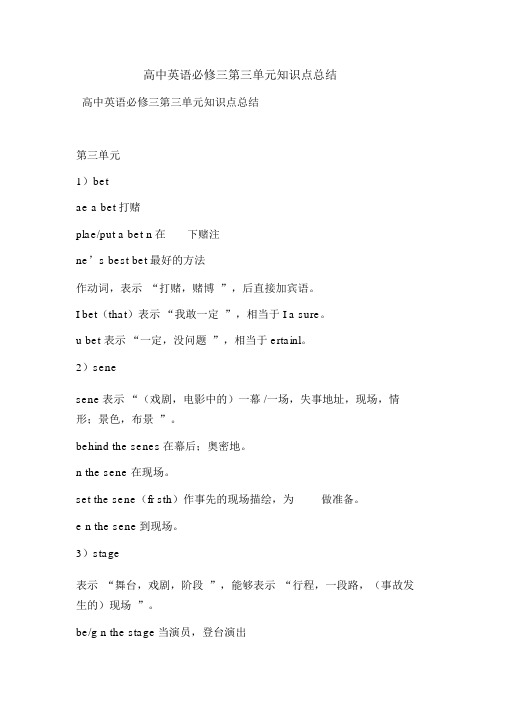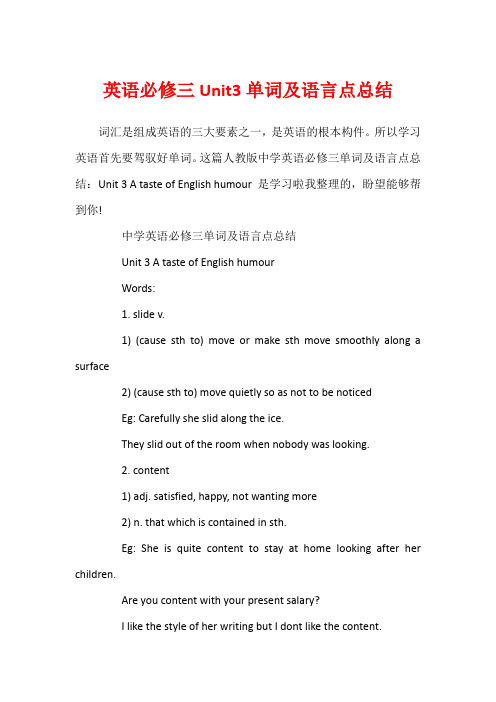高二英语必修三第三单元知识点三篇
高中英语必修三 Unit 3 Diverse Cultures知识点精讲(单词、短语、语法句型)

高中英语必修三 Unit 3 Diverse Cultures知识点精讲(单词、短语、语法句型)重点词汇1.admit (admitted。
admitting)XXX。
XXX。
For example。
"I have to admit that it definitely feels good to be back in the city again." It can also mean to allow someone to enter or join。
as in "If you leave the club。
you will not be admitted back in." Admit is often used with the n "to" or "into"。
and can be followed by a gerund or a noun。
For example。
"Dana admitted to being strict with her children" or "He was admitted into the club."2.occurOccur means to happen or take place。
For example。
"The accident occurred at five o'clock." It can also be used with the n"to" or "that"。
as in "It occurred to me that I had left my keys at home" or "It occurred to him to call his mother."易混辨析Occur。
英语必修三unit3知识点总结

英语必修三unit3知识点总结.doc英语必修三Unit 3知识点总结前言Unit 3作为英语必修三的重要组成部分,涵盖了丰富的语言知识点和文化背景知识。
本总结旨在帮助学生更好地理解和掌握本单元的核心内容。
第一部分:词汇学习1. 核心词汇Adjectives: beautiful, magnificent, unique, mysterious, ancient, traditional, cultural, historicalNouns: civilization, architecture, sculpture, painting, music, literature, philosophy, religionVerbs: admire, explore, create, preserve, appreciate, influence, develop, transform2. 短语搭配Explore the world: 探索世界Appreciate art: 欣赏艺术Influence culture: 影响文化Preserve history: 保护历史Develop skills: 发展技能第二部分:语法重点1. 被动语态被动语态的构成:be + past participle被动语态的使用:当动作的执行者不明确或不重要时2. 定语从句定语从句的引导词:who, whom, whose, which, that定语从句的作用:修饰先行词,提供更多信息3. 现在完成时现在完成时的形式:have/has + past participle现在完成时的用法:表示过去发生的动作对现在造成的影响或结果第三部分:阅读理解1. 文章结构标题:概括文章主题引言:介绍背景信息正文:详细阐述主题结尾:总结全文,提出观点或建议2. 阅读技巧快速阅读:获取文章大意精读:理解细节,分析作者意图推理判断:根据上下文推断词义或作者观点第四部分:写作技巧1. 写作结构引言:提出话题,吸引读者兴趣正文:分段落阐述观点,提供论据结尾:总结全文,提出个人看法或建议2. 写作技巧使用多样的句型和词汇注意段落之间的逻辑关系确保语法正确,拼写无误第五部分:文化背景知识1. 世界文化遗产介绍几个著名的世界文化遗产,如中国的长城,埃及的金字塔等探讨文化遗产对现代社会的影响2. 艺术与文化讨论不同艺术形式如何反映和塑造文化分析艺术与文化之间的关系第六部分:综合运用1. 口语表达练习描述文化遗产和艺术作品讨论文化遗产保护的重要性2. 听力理解听有关文化遗产和艺术的讲座或访谈练习捕捉关键信息,理解主旨大意结语Unit 3的学习不仅要求学生掌握语言知识,更要求学生能够理解和欣赏文化多样性。
高中英语必修三第三单元知识点总结

高中英语必修三第三单元知识点总结《高中英语必修三》第三单元主要涉及以下几个方面的知识点:人教版必修3Unit3 Sharks第一部分知识梳理。
第一节词汇梳理1.scope范围2.urge敦促3.tame驯服4.inferior低等的5.equip装备6.presumably大概7.instinct本能8.adventure冒险第二节短语梳理1.in search of寻找2.get(to)work开始工作3.be equipped with带有4.be inferior to比……差5.feed on以……为食6.look into调查7.result from起因于8.bear in mind牢记第三节语法梳理一、情态动词'would'与过去的情态相比,语义上表推测与提议。
1.表示过去习惯、倾向'most of the shark victims would have been men'2.表示推测,猜测‘the shark may have made a mistake', 'It would be Mr Hansen'3.表示礼貌、委婉的请求,宣布、征求,提议、归因'do you think he would have killed a dog?'二、句式推测的过去式'could/couldn't'做推测用法。
1.结构:主语+谓语+宾语+情态动词+have done2.推测过去是否发生:肯定推测为could/must have done否定推测:以couldn't/can't/mustn't/may not have done,译为‘(发生过)一定没做过/可能没做过/一定不可能做事’。
即:’He may not have survived'(他可能没有活下来); ‘He must have survived'(他一定活下来了)第四节重要内容梳理关于本单元的阅读材料本单元主要围绕大白鲨展开,涉及鲨鱼与人类的关系、鲨鱼袭击人类的原因、鲨鱼相关的科学研究等。
高中英语必修三第三单元知识点总结

高中英语必修三第三单元知识点总结高中英语必修三第三单元知识点总结第三单元1)betae a bet打赌plae/put a bet n在下赌注ne’s best bet最好的方法作动词,表示“打赌,赌博”,后直接加宾语。
I bet(that)表示“我敢一定”,相当于 I a sure。
u bet 表示“一定,没问题”,相当于 ertainl。
2)senesene表示“(戏剧,电影中的)一幕 /一场,失事地址,现场,情形;景色,布景”。
behind the senes在幕后;奥密地。
n the sene 在现场。
set the sene(fr sth)作事先的现场描绘,为做准备。
e n the sene到现场。
3)stage表示“舞台,戏剧,阶段”,能够表示“行程,一段路,(事故发生的)现场”。
be/g n the stage当演员,登台演出set the stage fr sth为某事做准备。
4)tale是可数名词,表示“传说,故事”。
tell its n tale 不言自喻,不言而喻。
)p erit作动词,后接名词或许代词,表示“同意,答应”;也能够表示“使可能”。
后接不定式的复合构造。
后接动名词,不可以直接跟不定式。
分词短语作状语。
后不可以随从句。
perit f sth 认同,容忍。
作名词,表示“同意证,执照,同意”。
6)aunt作名词,表示“表达,报导,原由,账目,户头”。
b/fr all aunts 依据大家所说的。
give an aunt f 表达,报导,说明。
作名词,表示“认为”时,后接复合宾语。
aunt fr 表示“做出解说,致使,是的原由”,还能够表示“占,捕获”。
常有的词组:ut f aunt 不考虑 n all aunts/n ever aunt不论怎样n n aunt决不tae int aunt/tae aunt f对加以考虑,顾及turn t gd aunt 利用7)ealusbe ealus f sb妒忌,生怕某人被别人夺走。
英语必修三Unit3单词及语言点总结

英语必修三Unit3单词及语言点总结词汇是组成英语的三大要素之一,是英语的根本构件。
所以学习英语首先要驾驭好单词。
这篇人教版中学英语必修三单词及语言点总结:Unit 3 A taste of English humour 是学习啦我整理的,盼望能够帮到你!中学英语必修三单词及语言点总结Unit 3 A taste of English humourWords:1. slide v.1) (cause sth to) move or make sth move smoothly along a surface2) (cause sth to) move quietly so as not to be noticedEg: Carefully she slid along the ice.They slid out of the room when nobody was looking.2. content1) adj. satisfied, happy, not wanting more2) n. that which is contained in sth.Eg: She is quite content to stay at home looking after her children.Are you content with your present salary?I like the style of her writing but I dont like the content.3. astonish vt. fill with sudden wonder or amazementeg: It will astonish you to hear what I paid for this ring.It was such an astonishing performance for such a young musician.4. particular1) adj. not general or universal2) adj. separate and distinct from others of the same group, category, or natureeg: She has a particular preference for Chinese art.We will make an exception in this particular case.5. entertain1) vt. to hold the attention of with something amusing or diverting2) vt. to hold the attention of with something.Eg: He entertained friends at dinner.I amused myself with a game of solitaire.They are much more entertaining than half the novels that are written.adj. entertaining n. entertainment6. throughout : prep. In, to, through, or during every part of; all througheg: The road is kept open throughout the year.The material is flawed throughout.Through unsure how her speech would be received, she remained calm and professional throughout.7. homeless1) adj. having no home or haven2) n. people without homes considered as a groupeg: When he broke away from his family, he became homeless.He often provides food to the homeless.8. failure n.1) the condition or fact of not achieving the desired end or ends2) one that failsEg: They were afraid of risking failure because they didnt want to lose face.Failure is the mother of success.He is a failure at his career.9. overcome vt. conquer; get the better ofeg: The learner of a second language has many obstacles to overcome.She was overcome with emotion.10. snowstorm n. a storm marked by heavy snowfalleg: According to the weather report, theres snowstormblowing up this evening.They were caught in the snowstorm.11. chew1) vt. to bite and grind with the teeth; masticate2) vt. to meditate on; ponder3) to cogitate; meditateeg: You must chew your food before you swallow it.He chewed a problem over.He chewed on the difficulties ahead.12. direct1) vt. to give guidance and instruction to2) vt. to give authoritative instructions to3) vt. to show or indicate the way foreg: Who directed the new Indian film?He directed the students to answer.The driver directed us to the airport.13. star vi. to play the leading role in a theatrical or film prodectioneg: One of my favorite old films starring Charlie Chaplin.Chenglong starred in many famous films.14. fortune1) n. [u] the chance happening of fortunate or adverse event;2) n. success, especially when at least partially resulting from luck3) a large sum of moneyeg: He decided to go home for the holidays, and his fortune turned for the worse.No matter what they tried, it ended in fortune.He spent a fortune on the new car.15. whisper1) vi. vt. to speak softly2) to make a soft rustling soundeg: He is whispering to his neighbor.The two girls were whispering in the library.The wind whispered in the pines.16. vast1) adj. very great in size, number, amount, or quantity2) very great in area or extent; immense3) very great in degree or intensityeg: We bought the house at vast cost.All the lands was shrouded in our vast forest.The city is vast compared to our village.Useful phrases:1. badly off : in a poor position, esp financiallyEg: They are too badly off to have a holiday.In fact most people are better off than they were five years ago.反义:well off2. worn-out1) adj. worn of used until no longer usable or effective2) thoroughly exhausted; spenteg: He wore a pair of worn-out shoes.I was worn-out after the long journey.3. pick out1) to choose or select2) to discern from the surroundings ; distinguisheg: They picked out the best piece of silk.They picked out their cousins from the crowd.4. cut off1) to separate from others; isolate2) to stop suddenly; discontinueeg: When the city was cut off, everyone know that the total defeat was certain.They cut off our food supply.The telephone operator cut us off.。
高中英语必修三第三单元知识点总结[页4]
![高中英语必修三第三单元知识点总结[页4]](https://img.taocdn.com/s3/m/ab664c3b524de518974b7d90.png)
高中英语必修三第三单元知识点总结[页4]b. it + be + -ed 分词+ that-从句it is believed that…人们相信……it is known to all that…从所周知……it has been decided that…已决定……c. it + be +名词+ that-从句it is common knowledge that………是常识it is a surprise that…令人惊奇的是……it is a fact that…事实是……d. it +不及物动词+ that-分句it appears that…似乎……it happens that…碰巧……it occurred to me that…我突然想起……七、名词性wh-从句1)由wh-词引导的名词从句叫做名词性wh-从句。
wh-词包括who, whom,. whose, whoever, what, whatever, which, whichever 等连接代词和where, when, how, why等连接副词。
wh-从句的语法功能除了和that-从句一样外,还可充当介词宾语、宾语补语和间接宾语等,例如:主语: how the book will sell depends on its author. 书销售如何取决于作者本人。
直接宾语:in one’s own home one can do what one likes. 在自己家里可以随心所欲。
间接宾语:the club will give whoever wins a prize.俱乐部将给得胜者设奖。
表语: my question is who will take over president of the foundation. 我的问题是谁将接任该基金会主席职位。
宾语补足语:she will name him whatever she wants to. 她高兴给他起什么名字就取什么名字。
高中英语必修三第三单元知识点总结

高中英语必修三第三单元知识点总结在高中英语必修三的第三单元中,我们主要学习了关于描述人和事情的形容词和副词,以及相关的语法和用法。
下面将对这些知识点进行总结和归纳。
形容词和副词的比较级和最高级比较级用于两个人或物之间的比较,最高级用于三个或三个以上的人或物之间的比较。
•形容词的比较级和最高级规则:–单音节词:比较级在词尾加-er,最高级在词尾加-est。
如:tall(高)-taller(更高)- tallest(最高)。
–部分双音节词:在词尾加-er,-est。
如:clever(聪明)- cleverer(更聪明)- cleverest(最聪明)。
–多音节词和部分双音节词及部分以-y结尾的词:在前面加more或most。
如:beautiful(美丽)- more beautiful(更美丽)- most beautiful(最美丽)。
•副词的比较级和最高级规则:–单音节词:比较级和最高级在词尾加-er,-est。
如:fast(快速地)- faster (更快地)- fastest(最快地)。
–以-y结尾的词:变-y为-i,再加-er,-est。
如:heavy(重)- heavier(更重)- heaviest(最重)。
–多音节词和部分以-ly结尾的副词:在前面加more或most。
如:carefully (小心地)- more carefully(更小心地)- most carefully(最小心地)。
形容词和副词的用法和注意事项•形容词用法:–修饰名词,用于句子的主语、宾语、定语等。
如:a beautiful garden(一个美丽的花园)、He is tall(他很高)。
–作表语,连接系动词和名词。
如:She is clever(她很聪明)。
•副词用法:–修饰动词,表示动作的方式、程度或频率。
如:She runs fast.(她跑得快)。
–修饰形容词或副词,表示程度或程度的变化。
如:He is very tall.(他很高)。
高中必修三英语第三单元知识点

高中必修三英语第三单元知识点高尚的生活是受爱鼓励并由学问导引的生活……没有学问的爱与没有爱的学问,都不行能产生高尚的生活。
下面我给大家共享一些中学必修三英语第三单元学问点,盼望能够协助大家,欢送阅读!中学必修三英语第三单元学问1【重点词汇、短语】1.tak.plac.发生2.religiou.宗教的3.i.memor.o.纪念4.belie.信任,信念,信仰5.dres.u.盛装,妆扮6.tric.阴谋,窍门7.pla..tric.o.搞恶作剧,诈骗8.gai.获得9.gathe.搜集,集合10.awar.奖品,授予11.admir.赞美,敬佩12.loo.forwar.t.期望,渴望13.da.an.nigh.日夜14.a.thoug.似乎15.hav.fu.wit.玩的快乐16.permissio.许可,允许17.tur.u.出现,到场18.kee.one’.wor.守信用19.hol.one’.breat.屏息20.apologiz.致歉21.obviou.明显的22.se.of.启程,动身,使爆炸中学必修三英语第三单元学问2【重点句型】1.Pleas.mak.sur.whe.an.wher.th.accidenttoo.place.请查清晰事故是何时何地发生的。
2.Som.festiva.ar.hel.t.honou.th.dead,o.satisf.an.pleas.th.ancestors.wh.co ul.retur.eithe.t.hel.o.t.doharm.还有一些节日,是为了纪念死者、满意或取悦祖先,因为(祖先们)有可能回到世上协助他们,也有可能带来危害。
3.I.Japa.th.festiva.i.calle.Obon,whe.peopl.shoul.got.clea.th.grave.an.ligh.incens.i.memor.o.thei.ancestor s.(非限制性定语从句)在日本,这个节叫孟兰盆节,在这个节日里,人们要上坟、扫墓、烧香,以缅怀祖先。
- 1、下载文档前请自行甄别文档内容的完整性,平台不提供额外的编辑、内容补充、找答案等附加服务。
- 2、"仅部分预览"的文档,不可在线预览部分如存在完整性等问题,可反馈申请退款(可完整预览的文档不适用该条件!)。
- 3、如文档侵犯您的权益,请联系客服反馈,我们会尽快为您处理(人工客服工作时间:9:00-18:30)。
考试不可能脱离课本,做不到的难题,往往是你理解不够,究其原因还是课本不熟。
以下是为您推荐。
普通普通高中必修三英语第三单元知识1[重点句型]1. Please make sure when and where the accidenttook place.请查清楚事故是何时何地发生的。
2. Some festival are held to honour the dead,or satisfy and please theancestors, who could return either to help or to doharm.还有一些节日,是为了纪念死者、满足或取悦祖先,因为(祖先们)有可能回到世上帮助他们,也有可能带来危害。
3. In Japan the festival is called Obon,when people should goto clean thegraves and light incense in memory of their ancestors.(非限制性定语从句)在日本,这个节叫孟兰盆节,在这个节日里,人们要上坟、扫墓、烧香,以缅怀祖先。
4. They dress up and try to frighten people.他们乔装打扮去吓唬别人。
5. If they are not given anything, the childrenmight play a trick.如果你什么也不打发给孩子,他们可能会捉弄别人。
6. In India there is a national festival onOctober 2 to honour MahatmaGandhi, the leaderwhohelped gain India's independence from Britain.在印度,10 月 2 日是纪念马哈特马.甘地的全国性节日,他是帮助印度脱离英国而独立的领袖。
7. The most energetic and important festivalsare the ones that look forwardto the end of winter and to the coming ofspring.最富生气而又最重要的节日,就是告别冬天、迎来春天的日子。
8. The country is covered with cherry treeflowers so that it looks asthough it might be covered with pink snow.整个国度处处都是樱花盛开,看上去就像罩上了一层粉红色的雪。
普通普通高中必修三英语第三单元知识2[重点词汇、短语]1. take place 发生2. religious 宗教的3. in memory of 纪念4. belief 信任,信心,信仰5. dress up 盛装,打扮6. trick 诡计,窍门7. play a trick on 搞恶作剧,诈骗8. gain 获得9. gather 搜集,集合10. award 奖品,授予11. admire 赞美,钦佩12. look forward to 期望,盼望13. day and night 日夜14. as though 好像15. have fun with 玩的开心16. permission 许可,允许17. turn up 出现,到场18. keep one’s word 守信用19. hold one’s breath 屏息20. apologize 道歉21. obvious 显然的22. set off 出发,动身,使爆炸普通普通高中必修三英语第三单元知识3[语法总结]情态动词定义:情态动词是一种本身有一定的词义、但要与动词原形及其被动语态一起使用,给谓语动词增添情态色彩,表示说话人对有关行为或事物的态度和看法,认为其可能、应该或必要等。
情态动词数量不多,主要有下列:can(could), may (might), must, need, ought to, dare (dared), shall(should), will(would),have (to),had better.一. can 和 could 的用法1. 表示能力或客观可能性,还可以表示请求和允许。
注意:①could 也可表示请求,语气委婉,主要用于疑问句,不可用于肯定句,答语应用 can。
②can 表示能力时,还可用 be able to 代替。
2. 表示惊异、怀疑、不相信的态度。
(主要用在否定句、疑问句或惊叹句中)3. “can(could) have 过去分词”的疑问或否定形式表示对过去发生的行为怀疑或不肯定。
4. 用在疑问句及否定句中,表示惊讶,不相信等。
5. cannot…too……表示“无论怎样……也不过分”二. may 和 might 的用法1. 表示许可。
表示请求、允许时,might 比 may 的语气更委婉一些,否定回答时(口语中常用) no ,you can’t . or , yes,please 用mustn’t 表示“不可以”、“禁止”、“阻止”之意(具有强烈禁止的意思)。
用May I…征询对方许可在文体上比较正式,在口气上比较客气。
在日常口语中,用CanI …… 征询对方意见在现代口语中更为常见。
2. 用于祈使句中表示祝愿。
3. 表示推测、可能(疑问句不能用于此意)。
4. “may(might) have 过去分词”表示对过去发生的行为的推测。
三. must 和 have to 的用法1. 表示必须、必要。
(must 表示主观多一些而 have to 则表示客观多一些)回答 must 引出的问句时,如果是否定的回答,不能用mustn’t,而要用needn’t 或don’t have to。
2.“must be 表语”的结构表示推测,它的否定或疑问式用 can 代替must。
3. “must have 过去分词”的结构常用在肯定句中,表示对过去发生的行为的推测。
它的否定或疑问式用 can 代替 must。
4. have to 的含义与 must 相似,两者往往可以互换使用,但 have to 有各种形式,随 have 的变化而定。
注意:have to 也可拼做 have got to。
四. dare 和 need 的用法1. need 表示“需要”,作情态动词时,仅用于否定句或疑问句中,在肯定句中一般用 must, have to, ought to,或 should代替。
注意:needn't 不定式的完成式“表示本来不必做某事而实际上做了某事”2. dare 作情态动词时,主要用于疑问句、否定句和条件状语从句中,一般不用在肯定句中。
3. dare 和 need 常用作实义动词,有时态、人称和数的变化,所不同的是,作实义动词时,在肯定句中,dare 后面通常接带 to的不定式,在否定和疑问句中,dare 后面可接带 to 或不带 to的不定式。
五. shall 和 should 的用法1.shall 的用法:①shall 用于第一人称,表示征求对方的意愿。
②shall 用于第一、第三人称疑问句中,表示说话人征求对方的意见或向对方请示。
③shall 用于第二、第三人称,表示说话人给对方命令、警告、允诺或威胁。
2.should 的用法:①should 表示劝告、建议、命令,其同义词是 ought to;在疑问句中,通常用 should 代替 ought to。
②Why(or How) should 结构表示说话人对某事不能理解,感到意外、惊异等意思。
意为“竟会”。
③“should have 过去分词”结构一般表示义务,表示应该做到而实际上没有做到,并包含一种埋怨、责备的口气。
六. will 和 would 的用法1. 表示请求、建议等,would 比 will 委婉客气。
2. 表示意志、愿望和决心。
3. 用“will be”和“will(would) have 过去分词”的结构表示推测,主要用于第二、三人称。
前者表示对目前情况的推测,后者表示对已经完成的动作或事态的推测。
4. would 可表示过去反复发生的动作或某种倾向。
5. 表料想或猜想。
七. ought to 的用法1. ought to 表示应该。
2. 表示推测。
注意与 must 表示推测时的区别:Hemust be at home by now. (断定他已到家)He ought to be home by now. (不十分肯定)This iswhere the oil must be. (比较直率)This is where the oilought to be. (比较含蓄)3. “ought to have 过去分词”表示过去应做某事而实际未做。
ought 和 should 的区别:1.ought语气略强。
2.should较常用。
3.ought在美国英语中用的很少,而 should 却相当常用。
4.ought属正式用语。
八. used to,had better,would rather 的用法1. used to 表示过去的习惯动作或状态,现在已不存在,在间接引语中,其形式可不变。
如:Hetold us he used to play football when he was young.2. had better 意为“最好”,后接不带 to 不定式。
3. would rather 意为“宁愿”,表选择,后接不带 to 的不定式。
